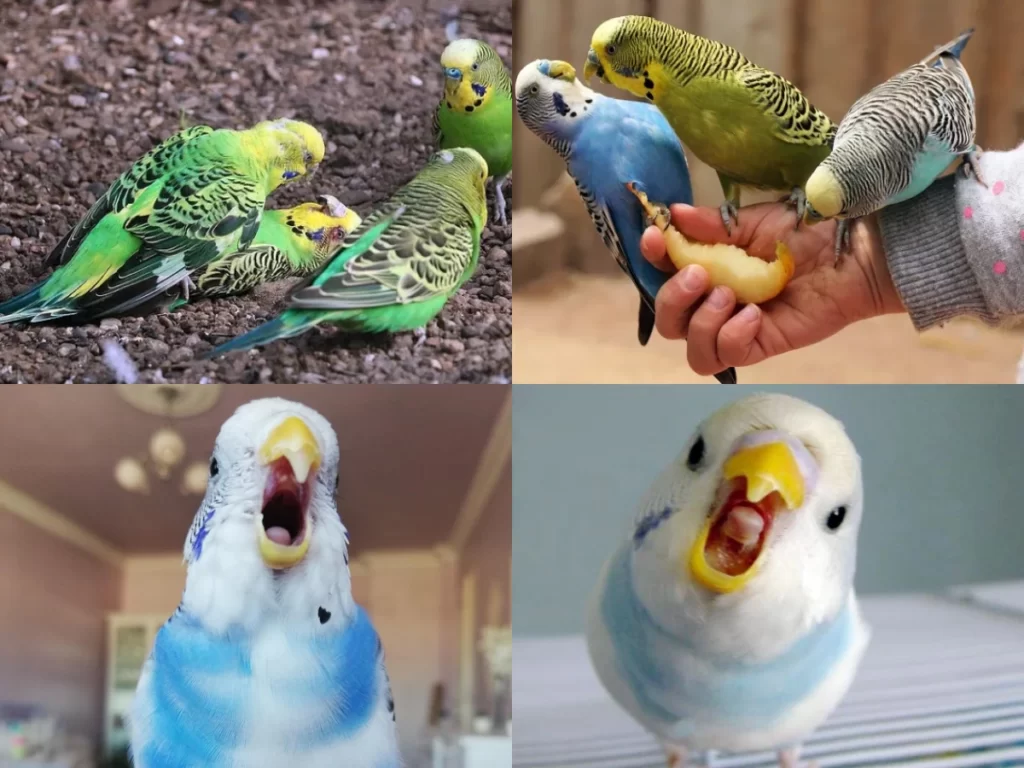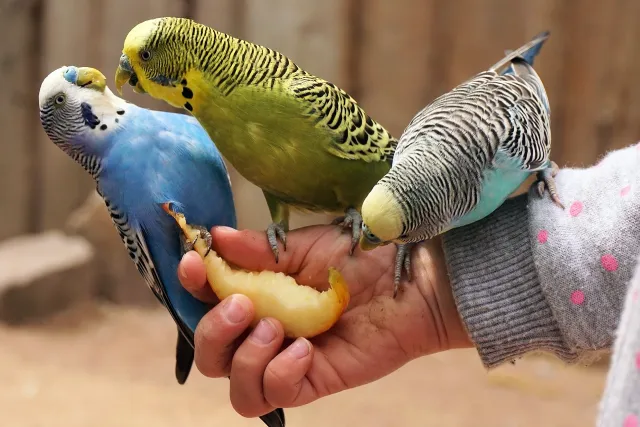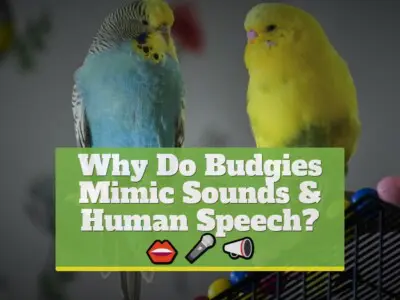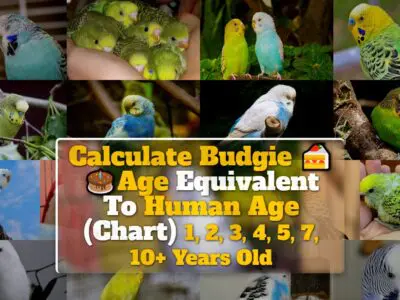Budgies might bite due to various behaviors or reactions to their environment.
They’re generally friendly, but factors like stress, fear, or playfulness can trigger nips.
Using data on the monk parakeet, a close relative, a budgie’s bite force is estimated at approximately ≈5 Newtons.
However, this is an approximation based on body mass and might differ based on factors like diet, jaw structure, and more.
For many bird enthusiasts, including myself, the unique behavior of budgies has always been a topic of intrigue.
A particular behavior that often puzzles many is their propensity to bite.
Having owned budgies and observed their behaviors closely, I’ve decided to delve deeper into understanding the reasons behind their biting.

Understanding Budgie Biting Behavior
Budgies, like many birds, have unique behaviors when it comes to how they use their beaks.
It’s crucial to understand these actions to ensure safe interactions and to maintain a healthy relationship with these feathered friends.
Natural Behavior vs. Learned Behavior
Natural behaviors are those that budgies are born with or develop as a part of their growth and survival instincts.
These behaviors can include foraging, preening, and yes, biting. In the wild, biting can be a way for budgies to defend themselves or to break apart food.
On the other hand, learned behaviors are developed based on experiences and interactions with their environment.
For example, if a budgie learns that biting gets them a reaction or attention they desire, they might start to bite more frequently.
It’s essential to be cautious about how we react to their actions, so we don’t inadvertently reinforce undesirable behaviors.
The Difference Between Beaking and Biting
Beaking and biting might seem similar, but they serve different purposes for budgies.
- Beaking: This is a gentle action where a budgie uses its beak to explore its surroundings, much like how babies use their mouths. It’s a curious act, often light, and doesn’t cause pain. Think of it as a way for them to “feel” or “touch” objects.
- Biting: This action is more forceful and can be a result of various reasons like fear, territorial disputes, or learned behaviors. Using data from monk parakeets, a close relative to budgies, we’ve estimated the bite force of a budgie to be approximately 4.865 Newtons. However, this value might differ based on individual budgies and situations.
Differentiating Between Soft Bites, Hard Bites, and Playful Nips
Understanding the intensity and intent behind a budgie’s bite can give us insight into their mood or needs.
- Soft Bites: These are gentle and usually harmless. Soft bites can be a way for budgies to communicate or get your attention. They can also be a sign of affection or a gentle reminder to back off.
- Hard Bites: These are stronger and can cause pain. Hard bites often stem from fear, aggression, or territoriality. Given the estimated bite force we derived earlier, it’s clear that a budgie’s hard bite can be surprisingly powerful for such a small bird.
- Playful Nips: Playful nips are somewhere in between soft bites and hard bites. Budgies might give playful nips during play or when they’re excited. Recognizing these as playful actions and not as aggressive ones is vital to maintain a positive relationship with your budgie.
In conclusion, understanding the nuances of a budgie’s biting behavior is essential for ensuring a happy and healthy bond with them.
Whether it’s a soft bite or a playful nip, always pay attention to their cues and respond with patience and understanding.
Reasons Why Budgies Bite
Understanding why budgies bite is the first step to having a healthy relationship with them.
There are a few reasons why these little birds might give a nip or a bite.
Fear Biting
When budgies are scared, they might bite as a way to defend themselves.
Just like how we might shout when we’re startled!
Triggers and Signs of a Scared Budgie:
- Sudden movements or loud noises can startle them.
- If a budgie feels cornered or trapped, it might bite.
- Watch for signs like ruffled feathers, a fluffed-up appearance, or fast breathing. These can all mean your budgie is scared!
Dominance Biting 📺
In the wild, birds establish a pecking order. This means they figure out who’s in charge!
Sometimes, budgies might bite to show that they’re the boss.
Establishing Territory and Pecking Order:
- Budgies might bite if they feel another bird (or even a human!) is in their space.
- It can also happen if two budgies are trying to figure out who’s in charge.
- If you have more than one budgie, make sure they have enough space and separate food bowls to avoid disputes.

Hormonal Biting
Just like people, budgies can have moods based on their hormones, especially during mating season.
Mating Behaviors and Aggression:
- When it’s mating season, budgies might become a bit more aggressive.
- They could also become more territorial and protective of their space.
- It’s important to be patient during these times and give your budgie some space.
Boredom Biting
Imagine being stuck in a room with nothing to do. You’d get pretty bored, right?
Budgies feel the same way!
Importance of Mental Stimulation and Toys:
- Budgies are smart and need things to keep their minds busy.
- Toys, puzzles, and new challenges can prevent them from getting bored.
- If a budgie is bored, it might start biting its cage, its toys, or even you! Make sure to give them fun activities to keep them entertained.
Health-Related Biting
When budgies aren’t feeling their best, they might get a bit grumpy, just like when you have a bad day and feel a little moody.
How Pain or Discomfort Might Lead to Biting:
- Illnesses or injuries can make a budgie uncomfortable.
- When they hurt, they might not want to be touched and could bite to say “leave me alone.”
- If your budgie is biting more than usual and you’re not sure why, it could be a sign that something is hurting them. A visit to the vet might be a good idea.
Interaction with Humans
Budgies and humans can be the best of friends. But sometimes, misunderstandings happen.
It’s essential to learn about these little misunderstandings to avoid unwanted bites.
Why Budgies Might Bite When Pet, Fed, or Held:
- Some budgies love being petted, while others don’t. Not every bird likes the same kind of touch.
- They might be a little scared or not used to being held.
- Hungry budgies might get a bit too eager when you’re feeding them and accidentally bite your finger instead of the food.
Misunderstandings and Mishandling:
- Budgies have their own way of saying things. If we don’t pay attention or if we handle them roughly, they might bite.
- Always be gentle and watch their body language. If they look scared or upset, give them some space.
Budgies Biting Each Other’s Beaks, Tails, and Feathers:
- Budgies like to play and sometimes, they play rough!
- They might nip at each other’s beaks or pull each other’s feathers in a playful manner.
- But, if they’re doing it too often or too hard, it could be a sign of a problem.
Environmental Factors
Imagine if you lived in a place that was too loud, too bright, or too busy.
It might make you feel stressed. Budgies can feel stressed too if their environment isn’t comfortable.
Stressful Surroundings and Their Effects:
- Loud noises, bright lights, or too many things moving around can make budgies feel uneasy.
- When they’re stressed, they might become more likely to bite.
- Always make sure your budgie has a quiet, calm, and comfortable space to call home. It’ll make them feel safe and happy.
Biomechanical Analysis of Budgie Bites
Understanding how strong a budgie can bite is like solving a fun puzzle with many pieces.
Each piece helps scientists figure out how the bird’s mouth works!
Overview of Biomechanical Modelling in Assessing Bite Force:
Scientists use models to understand how things work. A biomechanical model helps scientists understand how living things, like budgies, use their muscles and bones to bite.
Jaw Muscle Masses and Their Significance:
- The muscles in a budgie’s jaw help it bite.
- The bigger the muscle, the stronger the bite might be.
- But there’s more to it than just size. How the muscle is shaped and where it’s located can make a big difference too.
PCSA Values and Their Role in Bite Strength:
- PCSA stands for Physiological Cross-Sectional Area. It sounds complicated, but it’s a way to measure a muscle.
- PCSA helps scientists figure out how strong a muscle can be. The bigger the PCSA, the stronger the muscle is likely to be.
Input-Forces vs. Output-Forces: A Comparison:
- Think of it like a seesaw. On one side you have the input-force (the effort you put in) and on the other side, you have the output-force (what you get out).
- In budgies, the input force comes from the muscles in their jaws. The output force is the bite!
The Impact of the Beak’s Opening Angle on Bite Force:
- A budgie’s beak can open at different angles, kind of like how you can open your mouth a little or a lot.
- The angle at which the beak opens can change how strong the bite is. Imagine trying to bite down on a cookie with your mouth only slightly open versus wide open!
Estimating Bite Force Based on Body Mass:
If we’re curious about how hard a budgie might bite, we can consider its weight.
This method isn’t 100% precise, but it’s a good starting place. From certain data, we estimated that the force of a budgie’s bite could be around 4.865 Newtons (a unit for force) considering its weight.
How We Guessed the Bite Force of a Budgie:
For this estimate, we borrowed information from another bird, the monk parakeet, because scientists have studied its bite force.
Using the monk parakeet’s bite data and considering the budgie’s weight, we made our educated guess.
It’s similar to predicting a person’s strength by observing their older sibling’s capabilities!
However, it’s essential to note that this is an educated guess. The actual bite strength can vary due to factors like beak shape or muscle size.
Pain and Budgie Bites: What to Expect?
Have you ever been curious about how much a budgie’s bite might hurt?
Here’s a breakdown of what you might expect.
How Painful Is a Budgie Bite?
Budgies are small birds, and their bites might feel like a pinch.
However, the pain from a bite can vary. For some people, it might feel like a small prick, while others might think it’s a sharp nip.
The Relation Between Bite Force and Beak’s Opening Angle:
Just like we can bite harder when our mouths are open wider, budgies also have a connection between how wide their beak opens and how hard they can bite.
A budgie’s beak can open at different angles, and the wider it is open, the harder they might bite!
Can a Budgie Bite Break the Skin?
While a budgie’s bite force can approach 4.865 Newtons based on their size, it’s generally not powerful enough to break human skin, especially for adults.
However, children have more delicate skin, and an agitated budgie might leave a minor mark or slight pinch on them.
Always be cautious when kids interact with budgies.
Immediate Actions to Take If Bitten:
- Stay Calm – Remember, budgies are small and they usually don’t mean to hurt you.
- Wash the Area – If the skin is broken, clean the bite with soap and water.
- Avoid Quick Movements – Quick moves might scare the budgie more.
- Give Your Budgie Some Space – It’s best to let them cool down a bit.
Human Interaction and Budgies
Interacting with a budgie is so much fun! But just like us, they have their good and bad days.
Here’s how you can build trust and avoid getting bitten.
Building Trust with Your Budgie:
Building trust takes time. Start by spending time near their cage, talking softly to them.
As they get used to you, they’ll be more likely to come closer without feeling scared.
Training Techniques to Discourage Biting:
Training is all about helping your budgie understand what behaviors are okay.
Here are some steps to follow:
- Be Consistent – If you’re teaching a behavior, do it the same way each time.
- Use Gentle Corrections – If they do bite, a soft “no” is better than yelling.
- Reward Good Behavior – If your budgie is behaving well, give them a treat or some praise!
Positive Reinforcement vs. Punishment:
Just like people, budgies respond better to positive rewards than punishments. Instead of scolding your budgie for biting, try rewarding them when they don’t bite.
This helps them understand what they should do!
Situations Where Budgies Might Bite (e.g., When Playing, When New, During Feeding):
Budgies have personalities, and sometimes they might bite in certain situations:
- When Playing – Just like kittens or puppies, budgies might get a little too excited when playing and give a nip.
- When New – New surroundings can be scary. Give your new budgie some time to adjust.
- During Feeding – Sometimes, if they’re very hungry, they might accidentally nip you when trying to get food.
- When Scared – If something startles your budgie, their first reaction might be to bite.
Remember, understanding your budgie and building trust is the key to a happy relationship!
Common Myths About Budgies and Biting
All Budgies Are Aggressive:
Budgies are generally friendly birds. But like all creatures, they have their unique personalities.
While some might be more inclined to nip, it’s not true that all budgies are aggressive.
The bite force of a budgie is estimated to be around 5 Newtons.
This force can cause discomfort but doesn’t indicate that the budgie is naturally aggressive.
Biting can be a form of communication or a reaction to certain situations.
Biting Means the Budgie Hates Its Owner:
Not at all! Biting can mean various things. Maybe they’re scared, stressed, or just playing.
Understanding their behavior and knowing how to respond can help improve your bond with them.
Budgies and Their Environment
Why Do Budgies Bite Their Cage?
Budgies often bite or chew their cage out of curiosity, boredom, or the natural need to keep their beaks sharp.
It’s important to provide them with toys and other items to chew on to help keep them engaged and satisfied.
Signs of Stress in Budgies.
Budgies might show changes in behavior, vocalization, or appetite when stressed. Aggressive behavior, like biting, could also be a sign.
Understanding what’s causing the stress and addressing it is key to a happy budgie.
Creating a Stress-Free Environment.
It’s crucial to create a comfortable space for your budgie. This means a clean cage, fresh water, a balanced diet, and toys to play with.
Make sure the cage is in a quiet spot but where the budgie can still see and interact with the family.
Frequently Asked Questions
Can Budgies Be Trained Not to Bite?
Absolutely! With patience and consistent training, you can teach your budgie not to bite.
Positive reinforcement, like treats and praise when they behave well, is an effective method.
What Should I Do If My Budgie Bites Me?
If a budgie bites, don’t panic or punish the bird. It’s better to try and understand why it happened.
Maybe they were scared or agitated. Stay calm and gently remove your hand.
Why Is My New Budgie Biting When I Try to Pet It?
New pets often need time to adjust to their environment and trust their human caretakers.
If your new budgie nips at you, it might be feeling scared or protective.
Give it time, move slowly, and show kindness to build trust.
Is It Okay to Keep a Budgie in a Cage All the Time?
No, budgies need time outside their cage to stretch, explore, and play.
Regularly allowing your budgie some freedom outside the cage (in a safe environment) is vital for its well-being.
Why Might a Budgie Bite Another Budgie?
Budgies are social creatures, but they can have disagreements or establish dominance.
If you notice one budgie biting another, it might be a sign of territorial behavior or a dominance display.
It’s essential to monitor their interactions to ensure they get along.


![New Budgie’s First Days at Home & Behavior [What to Do?]](https://www.petiska.com/wp-content/uploads/2022/05/new-budgies-first-days-at-home-behavior-what-to-do-1653309166-400x300.jpg)
